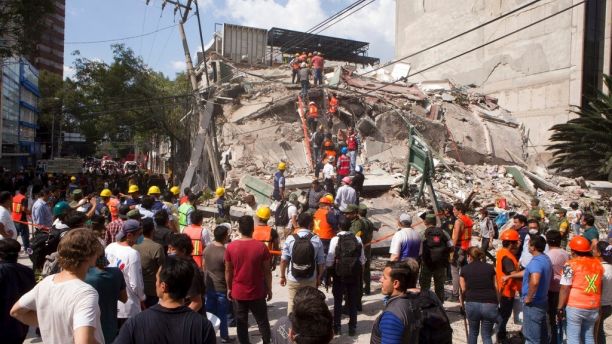West Responds to Devastation in Central America and the Caribbean
Sep 29, 2017
Shadowing the catastrophic impact of Hurricane Harvey and Hurricane Irma in the United States, Hurricane Maria has been devastating the Caribbean, specifically Puerto Rico, for the past few weeks. The Category 5 storm left approximately 1 million Puerto Ricans without any power before even touching base.
The impact of Hurricane Maria in Puerto Rico and other devastation in Mexico extends all the way to Niles West, where there is an estimate of 14.6 percent of students who identify as Hispanic, and many being Puerto Rican or Mexican.
Senior Daisha Ettienne, who identifies as Puerto Rican and Haitian, had a difficult time reaching her family after hearing news of the hurricane due to power lines going out. Though there are still complications, she is grateful to know that her family is safe.
“It’s actually impacted our family greatly. We didn’t hear from our family for about three days after the hurricane hit,” Ettienne said. “It’s especially difficult for my great-grandmother because she has diabetes, and she ran out of her medication. Other than that, we thank God our family is okay for the most part.”
The United States has been receiving great amounts of criticism from the media for not taking serious action or moving quickly enough to assist Puerto Rico. Tom Bossert, the President’s homeland security adviser, told reporters on Wednesday that the White House is organizing the needed resources as properly and quickly as possible.
“I understand the [media] coverage in some cases is giving the appearance we are not moving fast enough,” Bossert said. “What I will tell you is we are mobilizing and marshaling the resources of the United States of America in a way that is absolutely professional and fast and adequate to meet the needs.”
Other areas in Central America have also had troubling natural disasters. Mexico was hit by a 7.1 magnitude earthquake on Tuesday, Sept. 19 which had a toll of 344 people, the majority of deceased living in the central city. According to Enrique Pena Nieto, the President of Mexico, the damage might cost $2 billion, or perhaps even more.
Senior Chris Ramirez‘s family felt the aftershocks of the quake. Ramirez was scheduled to visit Mexico City but had to cancel due to his passport being expired. When his family attempted to purchase another ticket, the airline company refused due to the earthquake.
“The earthquake was two states away from our state, so my aunt actually felt the vibrations. She was opening the door to her house after going grocery shopping, and she shook a little bit because, you know, the earth was shaking,” Ramirez said. “I was supposed to go to Mexico City the week of the earthquake, but I didn’t go because of my passport expiring. We were going to get tickets to Mexico City, but we the airline didn’t let us because of the earthquake.”
The people of Puerto Rico continue to be in need of aid. Approximately 80 percent of the power lines are still down, and the country is facing huge waves of heat. Carmen Yulín Cruz, the mayor of Puerto Rico’s capital of San Juan, broke down during a TV interview with WUSA-TV in which she described how the island’s inhabitants are struggling for their lives.
“I know that leaders aren’t supposed to cry and especially not on TV, but we are having a humanitarian crisis,” Cruz said. “It’s life or death, every moment we spend planning a meeting or every moment we spend just not getting the help we’re supposed to get, people, are starting to die.”




